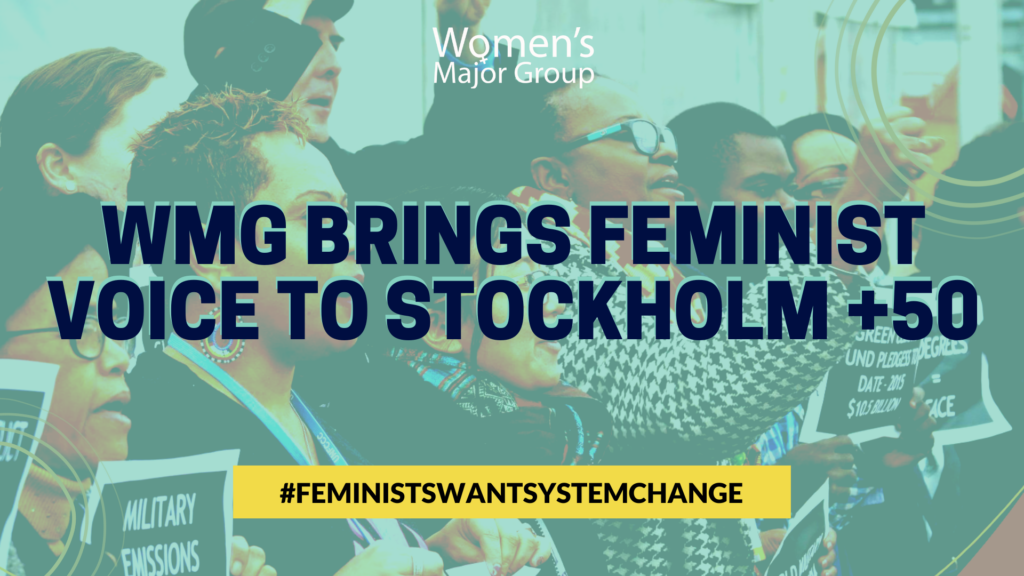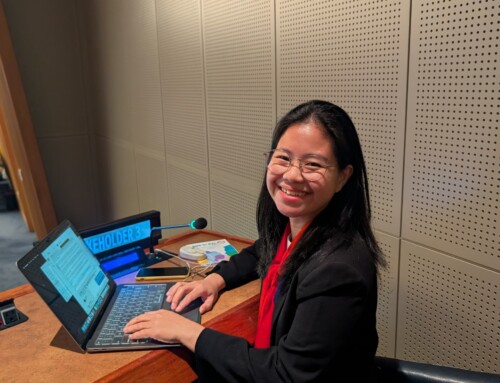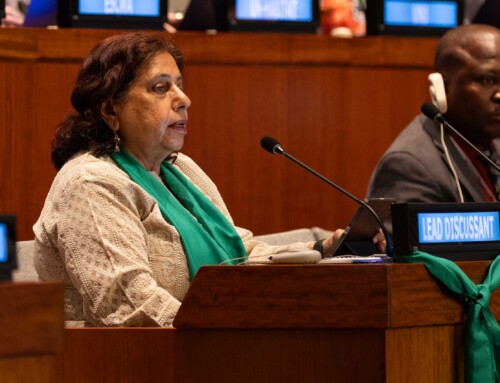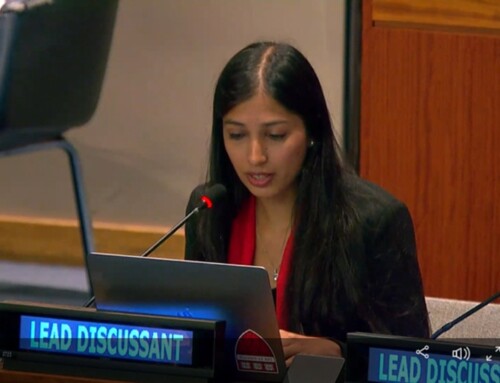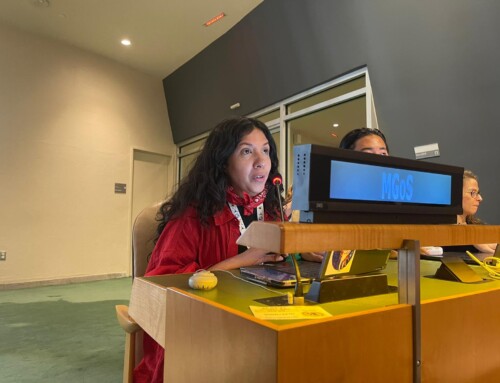Stockholm+50 High Level Meeting looked at the past 50 years of global environmental action, under the theme: “Stockholm+50: a healthy planet for the prosperity of all – our responsibility, our opportunity.” The gathering served as an opportunity for nations and stakeholders to collaborate, share expertise and address complex nexus issues for urgent actions and long-term system change. Following are statements given by our feminist ally constituency the Women’s Major Group at UNEA during Stockholm +50:
A) Intervention from Women’s Major Group at UNEA during Stockholm +50 presented by Zoneziwoh Mbondgulo – Wondieh
“Honorable excellencies and delegates,
I am speaking on behalf of the Women’s Major Group to the UN, my name is Zoneziwoh from the NGO Women for a Change in Cameroon.
This week the Women Major Group hosted an associated Stockholm+50 event, bringing together feminists from all continents, including many countries that are trying to recover from the Covid pandemic. In my region thousands of women have lost their livelihoods due to covid, climate change, as well violent conflicts. Similarly the war in Ukraine is impacting all countries’ food security.
In the background paper for this session, it says that young people, women, rural communities, and indigenous peoples play a central role in sustainable, inclusive, and resilient recovery processes.
Indeed, we should.
But women, girls, and gender-diverse people have been disproportionately impacted.
We need to understand and address the systematic and historic inequalities that are the cause, including colonialism, militarism, patriarchy and extractivism.
What we need is a shift away from the current dominant systems of oppression and exploitation of people and planet.
As feminists we call on decision makers to:
- Divest from fossil fuels, stop the wars and redirect budgets to invest in care and in equitable recovery;
- Enact reparations for both institutionalized racism and climate damage, to advance environmental and economic justice. We call on this assembly to commit to a Loss and Damage fund;
- Ensure women and feminist organisations have a permanent seat at your decision making tables, and are implementors of your environment and climate policies, centering the leadership of global South women, girls, and gender-diverse people to influence these strategic spaces;
- Protect women environmental defenders, by implementing the Resolution on the Human Right to a healthy, safe and clean environment that was adopted only a few months ago;
- Advance a feminist vision for a decolonial green deal, to shift towards regenerative economies that center care for people and planet and ensure women’s human rights and a peaceful and healthy planet for all.
I thank you!”
—
B) Intervention from Women’s Major Group at UNEA during Stockholm +50 presented by Priscilla Achakpa
“Dear excellencies, delegates,
It is my honor to present key messages from the Women and Gender Equality Group. I am Priscilla Achakpa, global lead of Women Environmental Programme, Nigeria and representative of the Women’s Major Group.
In the lead-up to today, Gender equality and women’s empowerment has been a priority throughout the preparatory Stockholm +50 engagements. Stockholm+50 National Consultations, were held in 57 countries, supported by UNDP, that were gender responsive and socially inclusive dialogues on the main themes of Stockholm+50 and the Leadership Dialogues as they relate to each national context. Over 230 Stockholm+50 national events have thus taken place with more than 15,000 participants of consultation events and another 30,000 people engaging virtually. In many consultations, a majority of participants were women; feminists leaders and women’s groups calling for a healthier planet and more inclusive and sustainable development choices.
Secondly, at the Regional Consultations the Women’s Major Group (WMG) accredited to UNEP, was actively involved in regional discussions and have provided suggestions on the way forward for gender responsive environmental policies and programmes.
Thirdly, at the global level, in the Informal Working Groups for the Leadership Dialogues gender equality and women’s perspectives were integrated into the recommendations.
Lastly, through engagement with different organisations and partners that have mandates to implement gender responsive environmental actions, ranging from climate action to ecosystem restoration and sustainable consumption.
Let me share 6 key messages:
- Women and girls have the right to meaningful and equal participation in climate and environment decision-making and in planning processes at all levels. As we have at global UN level, we need seats for women’s groups at national level. Because women are leaders and managers, and often also are among the most impacted by climate change in terms of mortality, loss of livelihood and employment, food insecurity, greater burden of unpaid care work, and exposed to climate-induced and gender-based violence.
- We call on all countries to commit to a gender-responsive just transition for an inclusive, regenerative, green economy, in order to avoid the most catastrophic impacts of the climate crisis. This requires women’s equal rights to land tenure, finance, and support for rural women and farmers, their control over natural resources and access to green and decent jobs.
- Further, we call on all countries, UN agencies and multilateral organisations to significantly increase gender-responsive climate and environment finance, for women to take leadership in building resilience, financing loss and damage, and generating data and evidence on the gender-climate nexus across the sectors addressed by national-level climate policies and strategies. As we did in Nigeria, where my organisation WEP, jointly with the Federal Ministry of Environment, led a process of consultations resulting in a National Action Plan on Gender and Climate Change. The government of Nigeria has already allocated funding to the implementation of this plan. Also, our new Climate Change Act which was passed in parliament, and was acceeded to by the President, has specific provisions for women and youth representation in the council.
- We call on governments to strengthen and expand gender-responsive social protection systems to build resilience to economic and environmental shocks and address the specific risks and challenges faced by women and girls.
- We call on countries to strengthened environmental governance at all levels ensuring public participation and access to environmental information and justice, improved evidence-base and risk knowledge, and an effective response to the needs of stakeholder groups, including women, youth, indigenous peoples, local communities, people with disabilities, and others.
- We encourage countries to further develop feminist sustainable development policies.
Thank you very much Chairs.”
—

